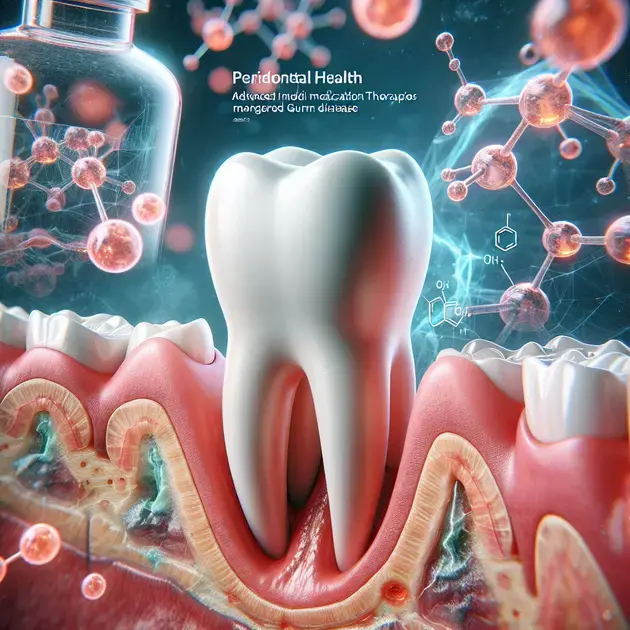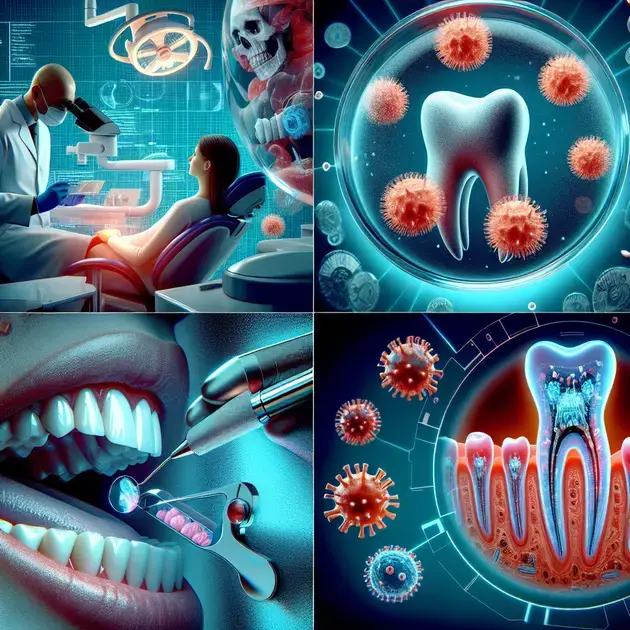Periodontitis is a common inflammatory disease that affects the soft and hard structures supporting the teeth. In this comprehensive guide, we will explore the most effective medication options available for treating periodontitis.
Recent studies have shown that combining traditional periodontal treatments with newer medication options can significantly improve the outcomes for patients with periodontitis. This guide will cover the different types of medications, their mechanisms of action, and the best practices for incorporating them into a comprehensive treatment plan.

Effective Medication Options for Periodontitis
Periodontitis is a serious gum infection that damages the soft tissue and destroys the bone that supports your teeth. In addition to professional dental treatment, medication can play a crucial role in managing this condition. Here are some effective medication options for periodontitis:
1. Antimicrobial Mouthwash:
One effective medication option for periodontitis is antimicrobial mouthwash, which can help reduce the bacteria in your mouth that contribute to gum disease. Examples of antimicrobial mouthwashes include Listerine and Colgate Total. You can find these mouthwashes at your local drugstore or order them online through the respective company websites.
2. Antibiotic Therapy:
In some cases, your dentist may prescribe antibiotics to help control the bacterial infection causing periodontitis. Common antibiotics used for periodontitis include doxycycline and metronidazole. You can get these antibiotics with a prescription from your dentist or through online pharmacy platforms like Honeybee Health.
3. Pain Relief Medication:
If you experience pain and discomfort due to periodontitis, over-the-counter pain relief medication like ibuprofen can help manage the symptoms. Brands like Advil and Motrin offer ibuprofen in various forms such as tablets and gel capsules, which you can purchase at your local pharmacy or order through online retailers like Amazon.
4. Anti-Inflammatory Drugs:
Anti-inflammatory drugs like corticosteroids can help reduce inflammation in the gums caused by periodontitis. Your dentist may prescribe corticosteroid medication in the form of a mouth rinse or gel. Websites like Drugs.com provide detailed information on different corticosteroid medications and their uses.
5. Prescription Strength Toothpaste:
Using a prescription strength toothpaste containing special ingredients like fluoride can help strengthen your tooth enamel and prevent further progression of periodontitis. Ask your dentist about prescription toothpaste options or search for them online on dental product websites like ProNamel.
Innovative Approaches to Treating Periodontitis
When it comes to treating periodontitis, traditional methods like scaling and root planing are effective, but there are also innovative approaches that can enhance treatment outcomes. Here are some innovative approaches to treating periodontitis:
…

**Key Points for Effective Periodontitis Medication**
Introduction
Periodontitis is a serious condition that affects the gums and bone that support the teeth. It is crucial to effectively manage periodontitis with the right medication in order to prevent further progression of the disease. This article will explore key points for effective periodontitis medication.
Understanding Periodontitis Medication
There are several medications that are commonly used to treat periodontitis, including antibiotics, antimicrobial mouthwashes, and enzyme suppressants. These medications work by targeting the bacteria that cause gum disease and reducing inflammation in the gums. It is important to follow your dentist’s recommendations and take the medication as prescribed to achieve the best results.
Benefits of Effective Medication
Effective periodontitis medication can help to reduce gum inflammation, control bacterial growth, and prevent bone loss around the teeth. By using the right medication, patients can experience improved gum health, reduced risk of tooth loss, and overall better oral health. It is important to work closely with your dental provider to find the most effective medication for your individual needs.
Considerations for Periodontitis Medication
Before starting any medication for periodontitis, it is important to discuss any allergies or potential side effects with your dentist. Some medications may interact with other medications you are taking, so it is important to provide a complete list of all medications to your dental provider. Additionally, it is important to follow proper oral hygiene practices while taking medication to maximize its effectiveness.
Conclusion
Overall, effective periodontitis medication plays a vital role in managing gum disease and preventing further complications. By understanding the key points for effective medication, patients can take control of their oral health and work towards achieving a healthier smile.
**Comprehensive Overview of Periodontal Treatment Strategies**
Introduction
When it comes to treating periodontal disease, a comprehensive approach is key to achieving optimal results. This article will provide a detailed overview of various treatment strategies that can be used to effectively manage periodontal disease and improve oral health.
Scaling and Root Planing
One of the most common treatments for periodontal disease is scaling and root planing. This procedure involves deep cleaning of the teeth and roots to remove plaque and tartar buildup. By smoothing the roots of the teeth, this treatment helps to prevent bacteria from accumulating and causing further damage to the gums and bone.
Antibiotic Therapy
In some cases, antibiotic therapy may be prescribed to help control bacterial growth in the gums. Antibiotics can be taken orally or applied directly to the affected areas to help reduce inflammation and promote healing. It is important to follow your dentist’s recommendations and complete the full course of antibiotics to ensure effective treatment.
Surgical Interventions
In more severe cases of periodontal disease, surgical interventions may be necessary to restore gum health and improve the stability of the teeth. Procedures such as gum grafts, bone regeneration, and pocket reduction surgery can help to repair damage caused by periodontal disease and prevent further progression of the condition.
Home Care Recommendations
In addition to professional treatments, it is important to follow a good oral hygiene routine at home to maintain the results of periodontal treatment. This includes brushing and flossing regularly, using an antimicrobial mouthwash, and attending regular dental check-ups. By combining professional treatments with proper home care, patients can achieve long-term success in managing periodontal disease.
Conclusion
Overall, a comprehensive approach to periodontal treatment is essential for effectively managing gum disease and maintaining good oral health. By utilizing a combination of treatment strategies, patients can work towards restoring gum health, preserving their natural teeth, and preventing future complications associated with periodontal disease.
**Enhancing Periodontal Health through Advanced Medication Therapies**
Introduction
Advancements in medication therapies have provided new opportunities for enhancing periodontal health and improving treatment outcomes for patients with gum disease. This article will explore how advanced medication therapies can be used to effectively manage periodontal disease and promote optimal oral health.
New Medication Options
In recent years, new medication options have become available for treating periodontal disease. These medications, such as local antimicrobials and targeted enzyme inhibitors, offer more precise and targeted treatment for gum disease. By using these advanced medication therapies, dentists can better control bacterial growth and inflammation in the gums.
Customized Treatment Plans
With the availability of advanced medication therapies, dentists can now create customized treatment plans for patients with periodontal disease. By tailoring medication options to each individual’s specific needs and response to treatment, dentists can achieve better results and improve long-term oral health outcomes for patients.
Combination Therapies
Combining different medication therapies with traditional periodontal treatments, such as scaling and root planing, can further enhance the effectiveness of treatment. By using a multi-faceted approach to managing gum disease, dentists can address the various aspects of periodontal disease and improve overall treatment outcomes for patients.
Patient Education and Compliance
As with any medication therapy, patient education and compliance are essential for achieving successful outcomes. Dentists must educate patients on the importance of taking their medication as prescribed, following proper oral hygiene practices, and attending regular follow-up appointments. By empowering patients to take an active role in their periodontal treatment, dentists can help ensure long-term success in managing gum disease.
Conclusion
Advanced medication therapies offer exciting new possibilities for enhancing periodontal health and improving treatment outcomes for patients with gum disease. By leveraging these new medication options, dentists can provide more effective and personalized care to patients, ultimately leading to better oral health and quality of life.
Conclusion
Periodontal medication plays a vital role in managing gum disease and preventing its progression. Understanding the key points for effective medication, such as antibiotics and antimicrobial mouthwashes, is crucial for achieving optimal results. By following the dentist’s recommendations, patients can reduce gum inflammation, control bacterial growth, and ultimately enhance their oral health.
A comprehensive treatment approach for periodontal disease, including scaling and root planing, antibiotic therapy, surgical interventions, and home care recommendations, is essential for maintaining good oral health. Combining these strategies can help restore gum health, preserve natural teeth, and prevent potential complications associated with periodontal disease.
Advanced medication therapies offer exciting possibilities for enhancing periodontal health. Customized treatment plans tailored to individual needs, along with a focus on patient education and compliance, can significantly improve treatment outcomes. By leveraging new medication options like local antimicrobials and targeted enzyme inhibitors, dentists can provide personalized care that leads to better oral health and overall quality of life.



